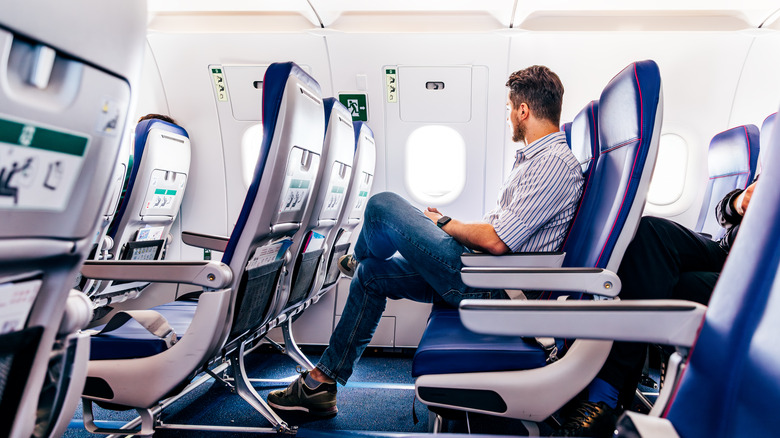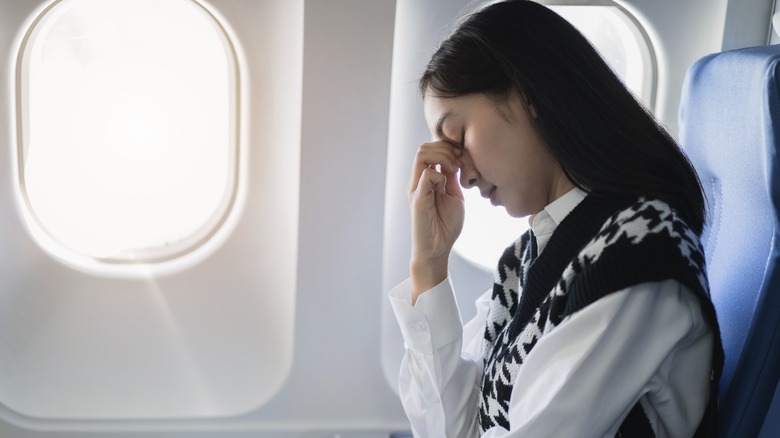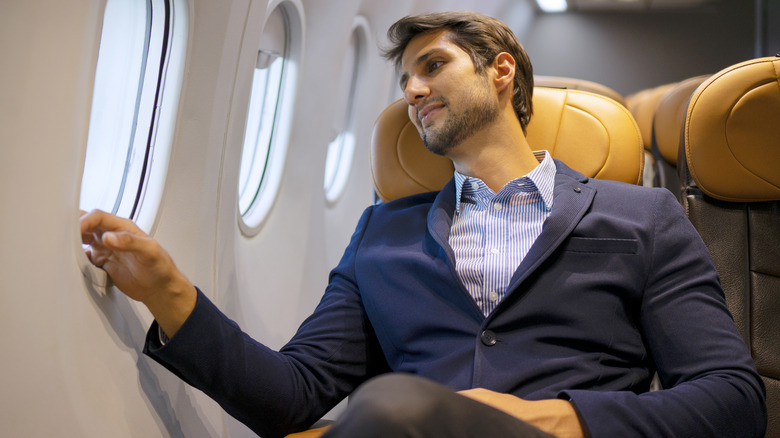The Unexpected Reasons 'Rawdogging' Your Next Flight Is More Dangerous Than You Think
Have you ever rawdogged on a flight? No, we're not referring to an NSFW act. Recently, rawdogging has taken on a new meaning when done at 30,000 feet, and the concept can best be summed up by a viral video posted to TikTok by @oiwudini. Over footage of the content creator sitting stone-faced in an economy seat is the text, "Just rawdogged a 7hr flight (new personal best) no headphones, no movie, no water, nothing. Incredible. The power of my mind knows no bounds."
@oiwudini 🧘🏻♂️ #fyp
Think of rawdogging as an ultra-minimalist approach to plane travel. Rather than surviving a long-haul flight with snacks, books, and airline-provided movies, you sit and do, well, nothing. It sounds harmless enough, but some experts warn that the trend comes with some surprising risks.
For starters, you might have a harder time beating jet lag and fatigue after rawdogging. Representatives from the booking website Netflights told The Daily Mail that staying awake during a long flight, without any source of distraction, prevents you from getting needed rest. As a result, you're more likely to arrive at your destination feeling dull and exhausted. Neuroscientist Mark Williams echoed this, telling BirminghamLive that flights are inherently stressful and overstimulating, and rawdogging doesn't give your brain a chance to power down. By the end of your journey, you may feel more stressed and exhausted than if you'd kept busy with a movie.
Expect to feel hungry and dehydrated
You've probably heard it before: Drink lots of water while flying. However, hopping on the rawdogging trend during your next trip means saying no to the beverage cart and skipping in-flight meals. If your flight only lasts an hour or two, you might not suffer any negative consequences, but if you're taking a long flight, copying @oiwudini and consuming "no water" for hours puts your health at risk.
Plane cabins are known to dehydrate the human body because the air circulating inside is much less humid than the air typically found back down on the ground. Generally, it's a good idea to drink even more water on a plane than you would when going about a normal day. Doing the opposite and rawdogging can lead to a range of dehydration symptoms, including fatigue, dizziness, headache, and muscle cramps.
Skipping in-flight meals can also take a toll on your health. Your blood sugar will likely drop, which may cause you to feel tired, shaky, and light-headed. You could even faint if you go several hours without eating. Social media clout isn't worth the risk.
Are there benefits of rawdogging flights?
Not all aspects of rawdogging flights are detrimental. Taking time to sit with your thoughts on a plane can encourage imagination and creativity, as Dr. Sandi Mann, a senior psychology lecturer at the University of Central Lancashire, told The Daily Mail. Similarly, Clinical Psychologist Dr. Daniel Glazer shared with the publication, "[T]his forced introspection could provide an opportunity to grapple with thoughts, emotions and self-awareness that our minds typically avoid or suppress when flooded with distractions." Put simply, rawdogging allows for reflection and mindfulness.
Avoiding in-flight entertainment and other distractions may also help you overcome your fear of flying. A writer named Luke Winkie, who calls himself a "nervous flier" and prefers to watch nothing more than the flight map when on a plane, told GQ that avoiding having to process new information — such as the plot of a romantic comedy — creates a feeling of safety. If you can relate, a less-is-more approach may help ease your anxiety when in the air.
Ultimately, rawdogging in its most extreme form might not be worth trying. On the other hand, some elements of the concept can be useful. Let your mind wander during your next flight, but also be sure to drink some water and take a nap.


